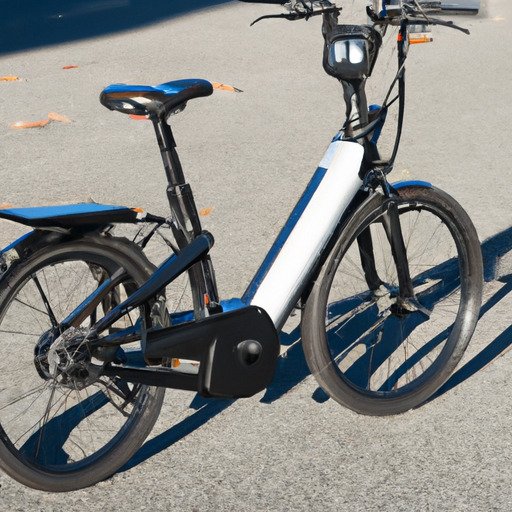
Curious about how e-bikes measure up to other electric vehicles when it comes to efficiency? Well, you’re in the right place! In this article, we’ll dive into the world of e-bikes and explore how they stack up against their four-wheeled counterparts. Whether you’re an eco-conscious commuter or just interested in the latest trends in electric vehicles, get ready to discover the ins and outs of e-bikes and find out if they’re the efficient mode of transportation you’ve been searching for. So, if you’ve ever wondered if e-bikes can go head-to-head with cars and motorcycles in terms of efficiency, keep reading to uncover the facts and learn more about this eco-friendly option.

Introduction
Overview of e-bikes and other electric vehicles
E-bikes, also known as electric bicycles, have been gaining popularity in recent years as a sustainable and efficient mode of transportation. These bikes are powered by an electric motor, which assists the rider in pedaling. They are considered as a form of personal transportation and are becoming increasingly common in urban areas.
On the other hand, electric vehicles (EVs) refer to a broader category of vehicles that rely on electricity for propulsion. This includes electric cars, electric motorcycles, and other types of electric-powered vehicles. These vehicles are gaining popularity due to their reduced environmental impact and decreased reliance on fossil fuels.
Importance of efficiency in electric vehicles
Efficiency is a crucial factor when considering the performance and sustainability of electric vehicles. The efficiency of an electric vehicle is determined by how effectively it converts stored energy into useful work, such as propelling the vehicle forward. A more efficient electric vehicle requires less energy input, resulting in a longer range and lower operating costs.
Efficient electric vehicles can play a significant role in reducing greenhouse gas emissions and minimizing the dependence on fossil fuels. They also offer potential economic benefits through reduced energy consumption and maintenance costs.
Efficiency of E-bikes
Factors affecting the efficiency of e-bikes
Several factors influence the efficiency of e-bikes. Firstly, the design and quality of the electric motor and battery system greatly impact the overall efficiency of the e-bike. High-quality motors and batteries can provide more power and energy, resulting in improved efficiency.
Furthermore, the weight of the e-bike and the rider can also affect its efficiency. Heavier loads require more energy to move, reducing overall efficiency. Therefore, lighter e-bikes are generally more efficient than heavier ones.
Additionally, the efficiency of e-bikes can be influenced by external factors such as terrain, wind resistance, and tire pressure. Uphill rides, strong headwinds, and improperly inflated tires can all contribute to decreased efficiency.
Comparison of e-bike efficiency with other electric vehicles
When comparing e-bike efficiency with other electric vehicles, it is important to note that e-bikes are generally more efficient than electric cars and motorcycles. E-bikes typically have lower power requirements and are designed for shorter trips and urban commuting, which results in higher overall efficiency.
Electric cars, while providing longer ranges, require larger and heavier batteries to meet their power demands. This additional weight reduces the overall efficiency compared to e-bikes. Electric motorcycles, although similar to e-bikes in terms of power requirements, tend to have larger motors and less efficient designs, resulting in slightly lower overall efficiency.
Advantages of E-bikes
Environmental benefits of e-bikes
One of the main advantages of e-bikes is their positive impact on the environment. By using the electric motor for assistance, e-bikes reduce the need for fossil fuel consumption, resulting in lower carbon emissions. They provide a greener alternative to traditional gasoline-powered vehicles, helping to mitigate climate change and improve air quality.
In addition, e-bikes generate minimal noise pollution compared to other electric vehicles, making them an attractive option for urban areas. Their quiet operation contributes to a more peaceful and sustainable urban environment.
Cost-effectiveness of e-bikes compared to other electric vehicles
Another significant advantage of e-bikes is their cost-effectiveness compared to other electric vehicles. E-bikes are considerably cheaper to purchase and maintain than electric cars or motorcycles. The cost of charging an e-bike is significantly lower than refueling a gasoline-powered vehicle, resulting in cost savings for the owner.
Moreover, e-bikes generally require less maintenance compared to other electric vehicles. They have fewer complex and expensive components, reducing the need for frequent servicing and repairs. This further contributes to their cost-effectiveness.
Efficiency of Other Electric Vehicles
Comparison of efficiency between e-bikes and electric cars
When comparing the efficiency of e-bikes and electric cars, it is essential to consider the purpose and design of each vehicle. While e-bikes are primarily designed for short-distance commuting, electric cars are intended for more extensive travel.
Electric cars typically have larger battery systems and motors to provide sufficient power for longer trips. However, this increased size and weight reduce their overall efficiency compared to e-bikes. E-bikes can achieve higher efficiency due to their lighter weight and more focused design for urban commuting.
Efficiency of e-bikes compared to electric motorcycles
E-bikes and electric motorcycles share some similarities in terms of power requirements and overall efficiency. However, electric motorcycles often have larger motors and designs focused on higher speeds, resulting in slightly lower efficiency compared to e-bikes.
E-bikes, with their smaller motors and lighter weight, can achieve higher efficiency while still providing a practical and efficient mode of transportation for short-distance travel.

Factors Impacting Efficiency
Battery technology and its effect on efficiency
Battery technology is a critical factor in determining the efficiency of electric vehicles, including e-bikes. Advances in battery technology have enabled improved energy storage and power delivery, resulting in increased efficiency.
Lithium-ion batteries have become the preferred option for many electric vehicles due to their high energy density and long lifespan. These batteries allow e-bikes to provide more power and achieve higher efficiency compared to older battery technologies.
Weight and aerodynamics in relation to efficiency
The weight and aerodynamics of an electric vehicle also play a significant role in determining its efficiency. Lighter vehicles are usually more energy-efficient since they require less force to accelerate and overcome resistance.
Aerodynamics also impact efficiency, especially at higher speeds. Streamlined designs and reduced wind resistance can enhance the efficiency of electric vehicles, allowing them to maintain higher speeds while using less energy.
Range and Charging
Comparison of range between e-bikes and other electric vehicles
E-bikes typically have a shorter range compared to electric cars and motorcycles due to their smaller battery capacity. However, for urban commuting and shorter trips, e-bikes provide sufficient range for most riders.
Electric cars, with their larger battery systems, can achieve much longer ranges, making them suitable for longer journeys and intercity travel. Electric motorcycles, although similar to e-bikes in terms of power requirements, often have larger batteries and provide a slightly longer range.
Charging time and infrastructure for different electric vehicles
Charging time and infrastructure availability are crucial considerations for electric vehicle owners. E-bikes generally have quicker charging times compared to other electric vehicles due to their smaller battery capacity. They can be charged using standard electrical outlets in a relatively short amount of time.
Electric cars and motorcycles often require dedicated charging stations with higher power outputs to facilitate faster charging. This infrastructure is more prevalent in urban areas, limiting the availability and convenience compared to e-bikes.
Practicality and Convenience
Ease of parking and maneuverability for e-bikes
E-bikes offer greater practicality and convenience in terms of parking and maneuverability compared to other electric vehicles. Their compact size and lightweight design allow for easier parking in crowded urban areas. E-bikes can be parked in designated bike racks or even inside buildings, providing added security and convenience for riders.
Additionally, e-bikes are more maneuverable, allowing riders to navigate through congested traffic and narrow alleyways. This maneuverability contributes to reduced travel times, making them a more efficient mode of transportation for urban commuters.
Comparing the practicality of e-bikes with electric cars
Electric cars, although providing longer ranges and higher passenger capacity, often face practicality challenges in urban areas. The need for adequate parking space, charging infrastructure, and congested traffic can limit the practicality of electric cars in densely populated cities.
E-bikes, on the other hand, offer a practical and efficient alternative for short-distance travel in urban environments. They can bypass congested areas, park easily, and provide quick transportation without the challenges associated with a larger vehicle.
Performance and Speed
Acceleration and top speed of e-bikes compared to other electric vehicles
E-bikes generally have lower acceleration and top speeds compared to electric cars and motorcycles. Their smaller motors and lightweight designs provide sufficient power for urban commuting but are not optimized for high-speed performance.
Electric cars, with their larger motors and greater power output, offer superior acceleration and higher top speeds. Similarly, electric motorcycles, designed for higher speeds, can achieve faster acceleration and top speeds compared to e-bikes.
Efficiency impact of speed for different electric vehicles
The efficiency of electric vehicles, including e-bikes, is impacted by the speed at which they are operated. E-bikes can achieve higher efficiencies at lower speeds, where the electric motor assists the rider in pedaling. Riding at higher speeds may result in decreased efficiency due to increased wind resistance and greater power requirements.
Similarly, electric cars and motorcycles experience decreased efficiency at higher speeds, as the power demand increases exponentially with speed. Maintaining lower speeds can optimize the overall efficiency of electric vehicles, regardless of the type.
Safety Considerations
Comparing safety features of e-bikes with other electric vehicles
Safety features vary among different electric vehicles, including e-bikes. E-bikes typically have basic safety features such as lights, reflectors, and sometimes, rearview mirrors. However, they may not have additional safety features commonly found in electric cars, such as airbags, seat belts, and advanced collision avoidance systems.
Electric cars often include comprehensive safety features to ensure the protection of passengers, such as multiple airbags, stability control, and active safety systems. These safety features make electric cars a safer option compared to e-bikes in terms of passenger protection.
Similarities and differences in safety regulations
The safety regulations governing e-bikes and other electric vehicles vary depending on the country and region. In general, e-bikes fall under the category of bicycles and are subject to similar regulations regarding helmet use, traffic rules, and speed limits. However, the regulations regarding maximum power output and speed restrictions can differ significantly.
Electric cars and motorcycles, being larger and more powerful vehicles, are subject to more stringent safety regulations. They often require comprehensive safety testing, licensing, and compliance with specific safety standards.
Conclusion
Summary of the efficiency comparison between e-bikes and other electric vehicles
In conclusion, e-bikes offer a highly efficient mode of transportation for short-distance commuting and urban travel. Their lightweight design, smaller power requirements, and lower cost make them a practical and cost-effective option compared to other electric vehicles.
While electric cars and motorcycles provide longer ranges and greater power, they often sacrifice some efficiency due to their larger size and weight. E-bikes, with their smaller motors and more focused design, can achieve higher overall efficiency.
Potential future advancements and improvements in efficiency
As technology continues to advance, further improvements in efficiency can be expected for all types of electric vehicles, including e-bikes. Advances in battery technology, motor efficiency, and aerodynamics can significantly enhance the efficiency of e-bikes and other electric vehicles, making them even more sustainable and cost-effective.
Furthermore, increased investments in charging infrastructure and the development of faster charging technologies can address the current limitations of electric vehicles, allowing for more widespread adoption and improved convenience for users.
As the demand for sustainable transportation grows, e-bikes are likely to play an increasingly important role in urban mobility. Their high efficiency, environmental benefits, and cost-effectiveness make them an attractive choice for individuals seeking a convenient and sustainable mode of transportation.




















